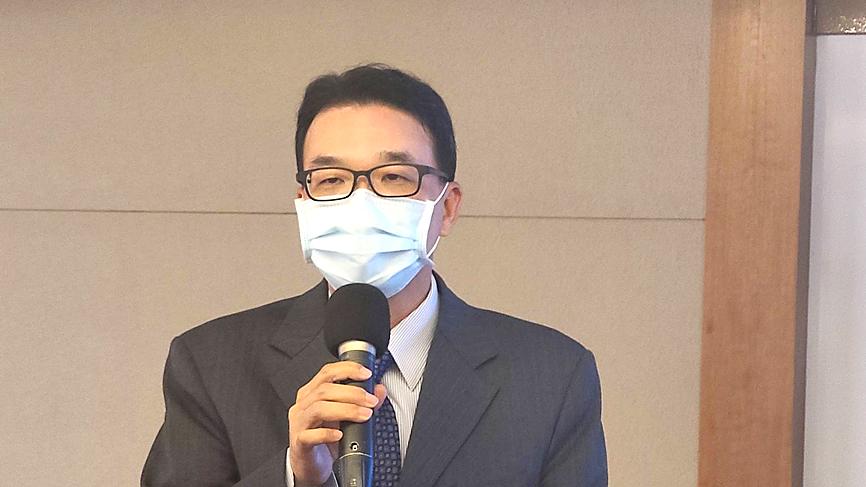Yang Ming Marine Transport Corp (陽明海運) yesterday gave a rosy outlook for the first half of this year on expectations that container shipping rates would remain high.
A combination of a shortage of empty containers and traffic congestion at ports worldwide due to the COVID-19 pandemic is expected to keep freight rates high until the end of June, Yang Ming president Patrick Tu (杜書勤) told an investors’ conference in Taipei.
Yang Ming is Taiwan’s second-largest container shipper by fleet size.

Photo: Wang Yi-hung, Taipei Times
It has negotiated new annual long-term contracts for its routes from Asia to the US with some of its clients, Tu said, adding that contract rates and capacity ordered by clients rose from a year earlier.
Yang Ming’s operations from Asia to the US made up 42 percent of its total revenue last year, followed by its operations in Europe with 32 percent and Asia with 26 percent, company data showed.
The shipping industry has had an oversupply problem over the past few years, but the issue would be resolved this year, Tu said, citing forecasts by maritime research firms such as London-based Drewry Shipping Consultants Ltd and Clarkson PLC.
Drewry has forecast that supply for container capacity would grow 4.5 percent this year and demand would rise 8.9 percent, while Clarkson projected a 3.8 percent gain in supply and 5.4 percent rise in demand, Tu said.
Whether Yang Ming would sustain its profit momentum in the second half of this year is still unclear, as it would depend on the pandemic and fuel costs, Tu said.
Overall, Yang Ming is optimistic about turning a profit, he said.
The company yesterday reported an average freight rate of US$1,140 per twenty-foot-equivalent unit (TEU) at the end of last year, up 50 percent from US$759 a year earlier, while its average fuel cost dropped 31 percent annually to US$321 per tonne.
Asked if the Suez Canal being blocked by the MV Ever Given container ship has affected Yang Ming’s operations, Tu said two Yang Ming vessels have turned south to sail around the Cape of Good Hope.
Although the change in course would add seven to 10 days to the shipping time, Yang Ming would not need to compensate its clients according to global maritime law, he said.
Yang Ming shares rose 3.68 percent to NT$35.25 in Taipei trading yesterday.

CHIP RACE: Three years of overbroad export controls drove foreign competitors to pursue their own AI chips, and ‘cost US taxpayers billions of dollars,’ Nvidia said China has figured out the US strategy for allowing it to buy Nvidia Corp’s H200s and is rejecting the artificial intelligence (AI) chip in favor of domestically developed semiconductors, White House AI adviser David Sacks said, citing news reports. US President Donald Trump on Monday said that he would allow shipments of Nvidia’s H200 chips to China, part of an administration effort backed by Sacks to challenge Chinese tech champions such as Huawei Technologies Co (華為) by bringing US competition to their home market. On Friday, Sacks signaled that he was uncertain about whether that approach would work. “They’re rejecting our chips,” Sacks

Taiwan’s exports soared 56 percent year-on-year to an all-time high of US$64.05 billion last month, propelled by surging global demand for artificial intelligence (AI), high-performance computing and cloud service infrastructure, the Ministry of Finance said yesterday. Department of Statistics Director-General Beatrice Tsai (蔡美娜) called the figure an unexpected upside surprise, citing a wave of technology orders from overseas customers alongside the usual year-end shopping season for technology products. Growth is likely to remain strong this month, she said, projecting a 40 percent to 45 percent expansion on an annual basis. The outperformance could prompt the Directorate-General of Budget, Accounting and

NATIONAL SECURITY: Intel’s testing of ACM tools despite US government control ‘highlights egregious gaps in US technology protection policies,’ a former official said Chipmaker Intel Corp has tested chipmaking tools this year from a toolmaker with deep roots in China and two overseas units that were targeted by US sanctions, according to two sources with direct knowledge of the matter. Intel, which fended off calls for its CEO’s resignation from US President Donald Trump in August over his alleged ties to China, got the tools from ACM Research Inc, a Fremont, California-based producer of chipmaking equipment. Two of ACM’s units, based in Shanghai and South Korea, were among a number of firms barred last year from receiving US technology over claims they have

BARRIERS: Gudeng’s chairman said it was unlikely that the US could replicate Taiwan’s science parks in Arizona, given its strict immigration policies and cultural differences Gudeng Precision Industrial Co (家登), which supplies wafer pods to the world’s major semiconductor firms, yesterday said it is in no rush to set up production in the US due to high costs. The company supplies its customers through a warehouse in Arizona jointly operated by TSS Holdings Ltd (德鑫控股), a joint holding of Gudeng and 17 Taiwanese firms in the semiconductor supply chain, including specialty plastic compounds producer Nytex Composites Co (耐特) and automated material handling system supplier Symtek Automation Asia Co (迅得). While the company has long been exploring the feasibility of setting up production in the US to address